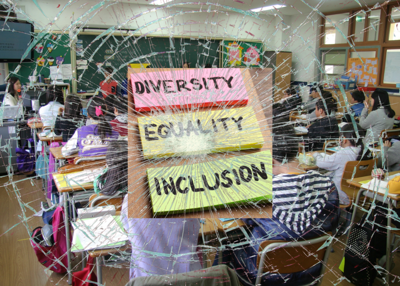
For many principals, teachers, administrators and parents of Latina/o/x students across Los Angeles and Southern California, the latest updates on DEI and education aren’t just headlines or memes online; they determine whether a child has access to free lunch or if a student can afford to attend college.
The Trump administration’s recent policy shifts have cast a long shadow over the Latino community’s involvement in the education system. With the Department of Education's mandate requiring schools and universities to dismantle diversity, equity and inclusion (DEI) initiatives within two weeks, the educational landscape for Latino students is poised for significant change that has not been seen in decades. If these changes proceed unchecked, they could erase years of policies and resources, leaving Latino students—particularly those in Los Angeles, where Latinos make up nearly 75% of LAUSD’s student population—more vulnerable than ever.
A legacy of struggle and progress
To understand the gravity of these changes, we must recognize the historical context of how these laws have actually been crucial to the Latino community in Southern California.
Federal policies have long dictated the trajectory of Latino education in the U.S. The 1968 Bilingual Education Act was one of the first federal acknowledgments that Latino students—many of whom were English learners—needed tailored resources to succeed. It was a landmark moment that legitimized bilingual instruction as a necessary tool for equitable education. Yet, Latino students continued to face systemic barriers beyond language after that 1968 bill. From the segregation of Mexican American students in the early 20th century to the landmark Mendez v. Westminster case that was actually fought in Orange County that helped pave the way for Brown v. Board of Education, the Latino community has had to fight relentlessly for access to quality education.
In recent decades, DEI initiatives have been one of the most effective tools in addressing these inequities. Programs designed to support first-generation college students, scholarships specifically for Latinos and curricula that include Latino history and culture have all played a role in ensuring that Latino students do not just enroll in schools but thrive in them.
Now, the administration’s attack on DEI programs threatens to erase these gains.
The war on DEI and its immediate consequences
The Trump administration has ordered all federally funded institutions to eliminate DEI offices and programs or risk losing funding. This move has already set off alarm bells in universities and school districts across the country.
Locally, this directive has prompted immediate responses from educational leaders. The California State University system acknowledged the Department of Education's letter and is reviewing its policies to ensure compliance. The University of California system, which adheres to Proposition 209 prohibiting race-based preferences, stated that it does not use such preferences in its practices.
Nationally, the University of Texas System, under the directive of state leaders influenced by federal trends, has started shutting down DEI programs that were instrumental in helping Latino and Black students navigate predominantly white institutions. Similarly, in Florida, Governor Ron DeSantis' administration has led the charge in eliminating DEI offices, setting a dangerous precedent that the federal government is now expanding nationally. These programs provided essential mentorship, scholarships and safe spaces for students who often feel alienated in higher education settings. It has already affected current Latino students pursuing higher education and will only affect more moving forward.
For many Latino students, DEI programs were lifelines. McDonald's has agreed to modify its HACER National Scholarship Program, which has traditionally awarded scholarships to Latino and Hispanic students. The company will now allow all students, regardless of ethnicity, to apply, focusing on applicants' impact and contributions to the Hispanic and Latino communities.
The chilling effect on K-12 students in Los Angeles
Teachers in predominantly Latino districts have reported young children are expressing anxiety over their parents being taken away. Reporting from CalMatters highlights how the fear of deportation has affected students in Salinas, California. Teachers report that discussions about ICE have become common in classrooms, with students expressing concerns about their families' safety. One teacher noted that, despite efforts to keep students focused on their schoolwork, the topic of ICE comes up so consistently that it disrupts learning.
Teachers in LAUSD have reported an increase in students expressing anxiety over their parents being taken away. Reports from local educators confirm that discussions about ICE have become so frequent that they disrupt learning. This climate of fear is not just anecdotal. A 2023 study from the UCLA Civil Rights Project found that schools with high Latino populations have seen drops in attendance following immigration raids in nearby neighborhoods.
Families are choosing to keep their children home rather than risk drawing attention to their undocumented status.
Resistance and resilience in Los Angeles
Despite these challenges, the Latino community and its allies are fighting back. All over the state of California, leaders are looking for solutions with universities exploring legal avenues to maintain programs that support Latino students, even if they must be rebranded under different names. Nonprofit organizations are stepping in to provide private funding for initiatives that once relied on federal dollars.











(0) comments
Welcome to the discussion.
Log In
Keep it Clean. Please avoid obscene, vulgar, lewd, racist or sexually-oriented language.
PLEASE TURN OFF YOUR CAPS LOCK.
Don't Threaten. Threats of harming another person will not be tolerated.
Be Truthful. Don't knowingly lie about anyone or anything.
Be Nice. No racism, sexism or any sort of -ism that is degrading to another person.
Be Proactive. Use the 'Report' link on each comment to let us know of abusive posts.
Share with Us. We'd love to hear eyewitness accounts, the history behind an article.